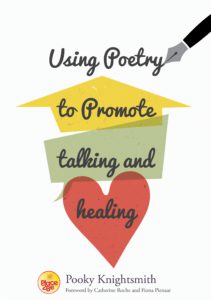You don’t need t o be a poet to write poetry, and you don’t need to write ‘good’ poetry to get a lot out of it. I’ve found that the very act of writing and reviewing poetry can be incredibly therapeutic regardless of what we might produce. Letting go of the idea that we need to be in some way talented with words to write poetry can open the door to a truly engaging, interesting and meaningful way to explore and express how we’re feeling.
o be a poet to write poetry, and you don’t need to write ‘good’ poetry to get a lot out of it. I’ve found that the very act of writing and reviewing poetry can be incredibly therapeutic regardless of what we might produce. Letting go of the idea that we need to be in some way talented with words to write poetry can open the door to a truly engaging, interesting and meaningful way to explore and express how we’re feeling.
In this blog post I’m exploring three key reasons why I’m an advocate of writing even the most terrible poetry – I hope it inspires you to give it a go (if so, you may find the fifty poetry writing prompts in my new book, Using Poetry to Promote Talking and Healing a good starting point).
1. Poetry as a form of reflection and moving on
There is something neat and finite about a poem. Unlike prose it has a clear beginning and end: it can feel finished. As such it can be a useful way of reflecting on a thought, feeling or experience and enabling us to move on. I often write poetry at the end of a difficult day – it helps me to transition between day and evening. The poem forms a bridge – a means of putting down on paper the many thoughts whirling around in my head. Once captured on paper I can let them go – I might choose to pick them back up tomorrow, but for now they are boxed up and I can move on and have a more restful evening.
2. Poetry as a way of communicating how we’re feeling
I am a firm believer that poetry can be written without rules. It can be a reflection of the here and now – of ourselves as we are experiencing the world in this moment. As such we often find that we can barely recognise ourselves in our past poems as we have grown and changed, but at the time of writing, a poem can be a powerful way of expressing just what we’re feeling and experiencing at a moment in time.
We can use any words we like, in any way we like. Grammar and punctuation (or lack of) and even how the poem is presented on the page can all contribute to helping to paint a picture of the here and now. Our poems can also form an important starting point for conversations, enabling others who care about us a way into our thoughts and feelings, providing avenues to explore and questions to ask.
A poem can’t provide the answers necessarily, but it can help to prompt the questions needed to get us talking and communicating which is an important first step.
3. Poetry can grow and change with us
One of the best things about writing ‘bad’ poetry is that we are not at all precious about it. We can rip it up and start again, or edit it over time. Instead of static perfect pieces, our poems can become fluid reflections of our thoughts and feelings which we might choose to revisit over time. If we had penned the ‘perfect’ poem then it is more likely to be frozen in aspic whereas a poem of which we are not proud is a living breathing thing. Something that will grow and change with us and help us to continue to explore the here and now as that grows and morphs from day to day or hour to hour.
—
I hope this makes poetry feel a little less scary for you – I wrote my first poem almost three years ago and have written a poem each day for over a thousand days since then. I would never claim to be a good poet (on some days I write astonishingly terrible poetry) but each poem I pen means something in the moment in which it is written. I would not un-write a single one and I look forward to writing many more.
Have a go – you might just find you get bitten by the poetry bug too!
You can read my daily poems on my poetry blog and for a comprehensive look at how poetry can be used to aid discussion on difficult topics you can read my new book, which includes an anthology of over a hundred of my poems – both good and bad.
Click here to find out more about Using Poetry to Promote Talking and Healing